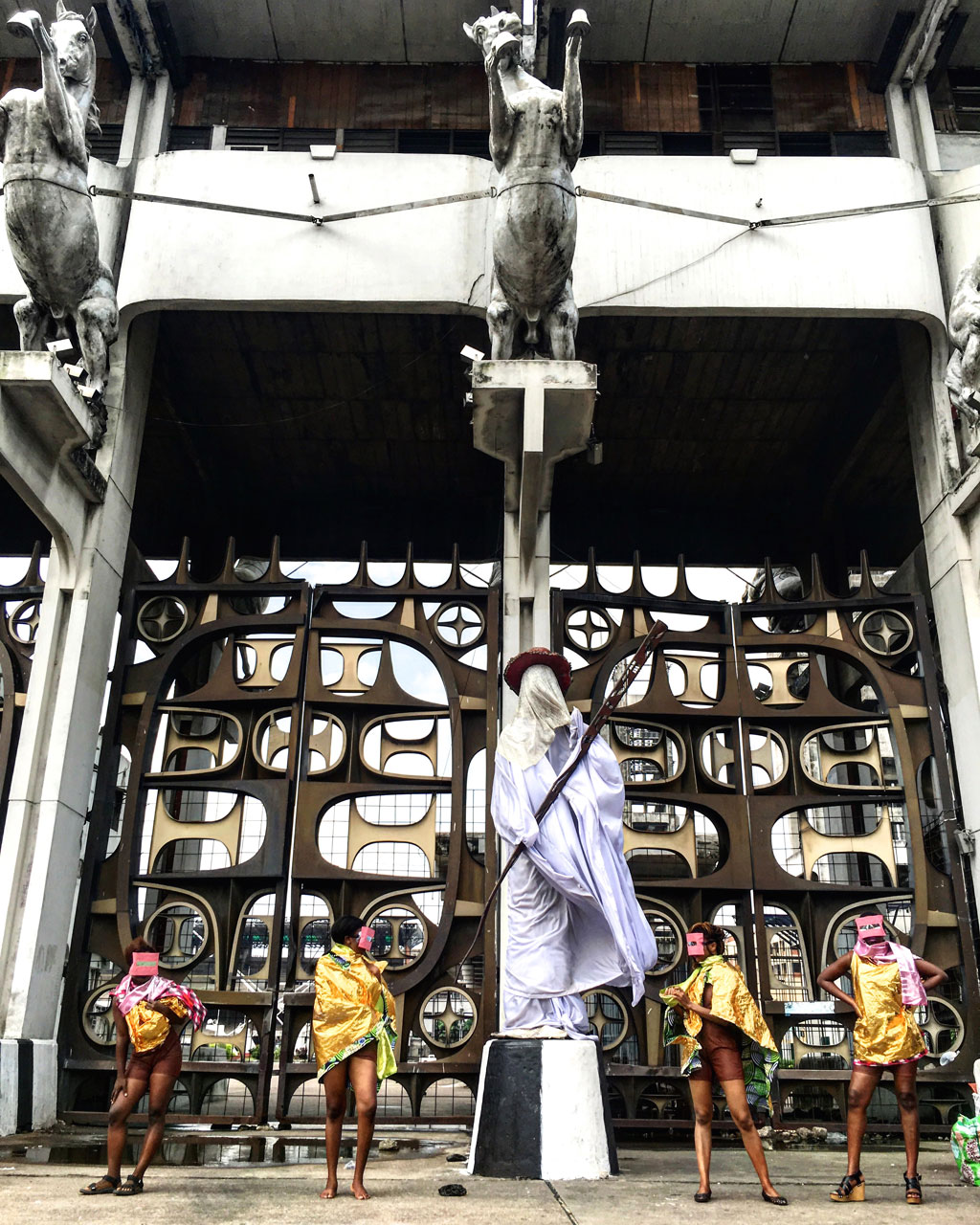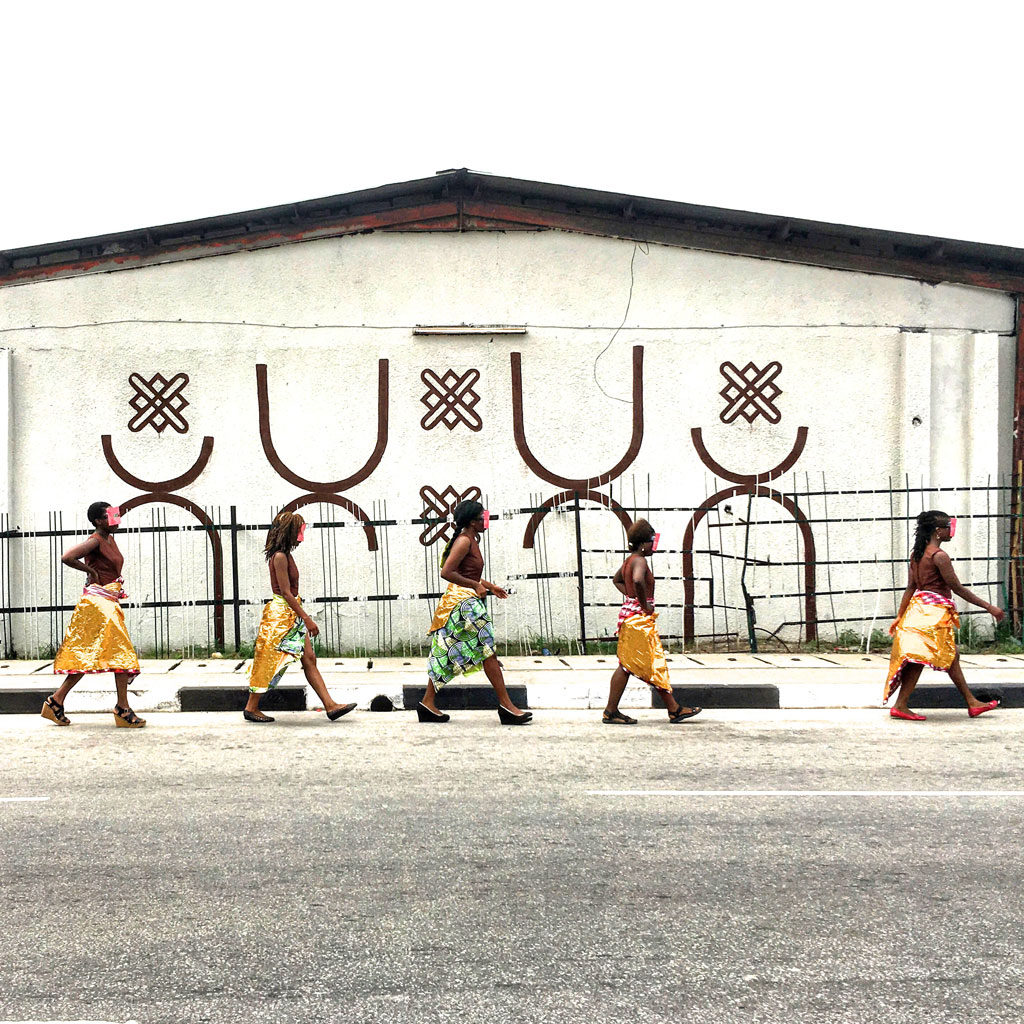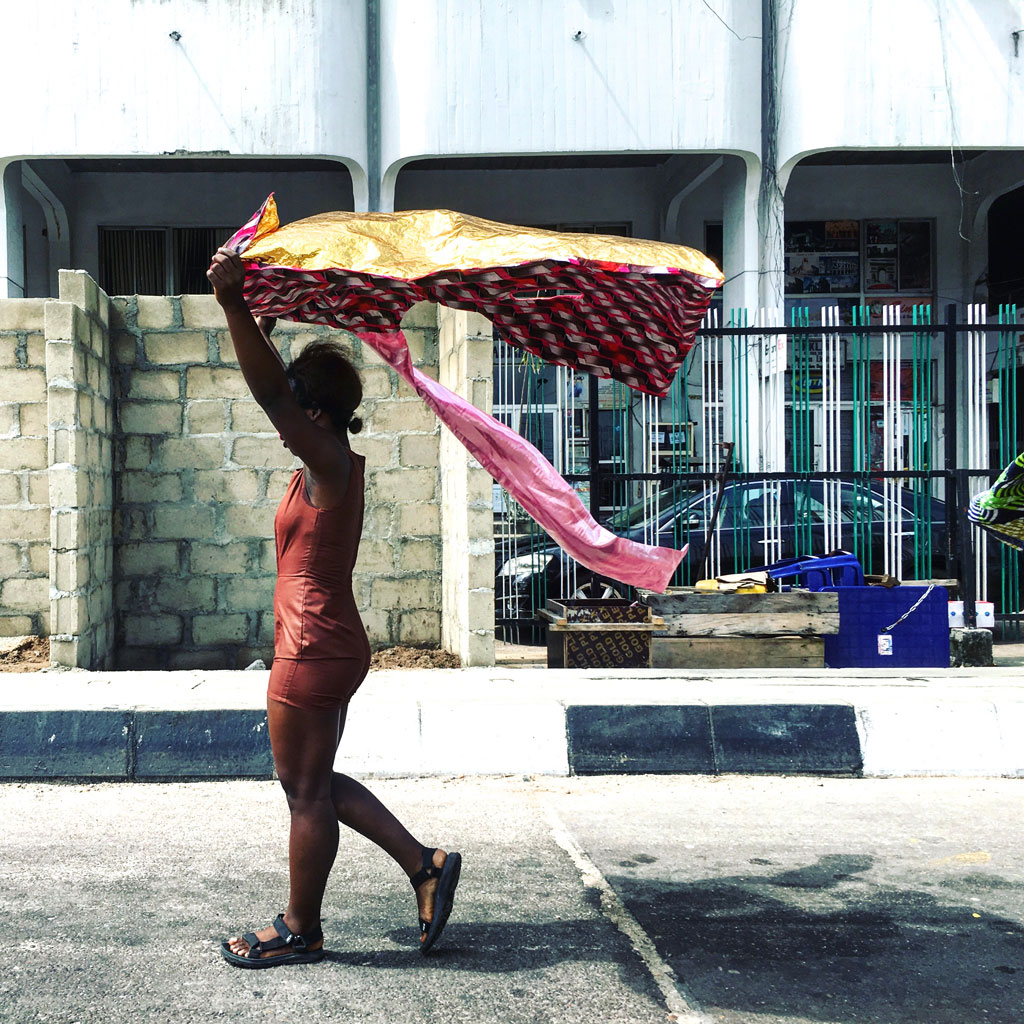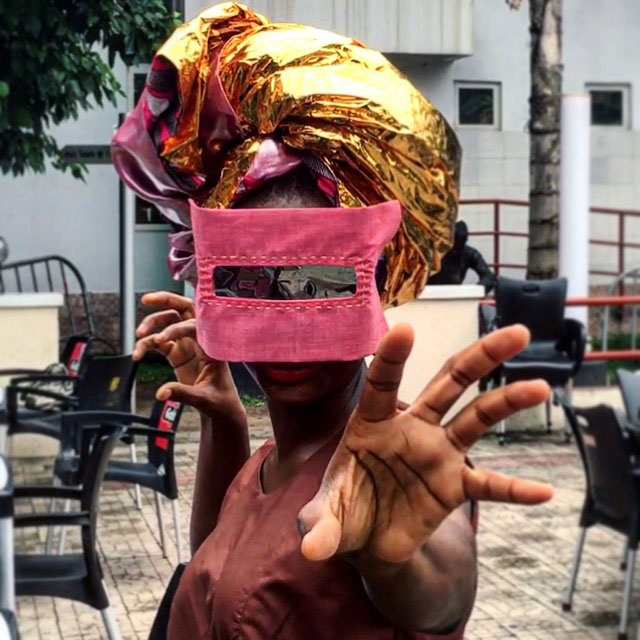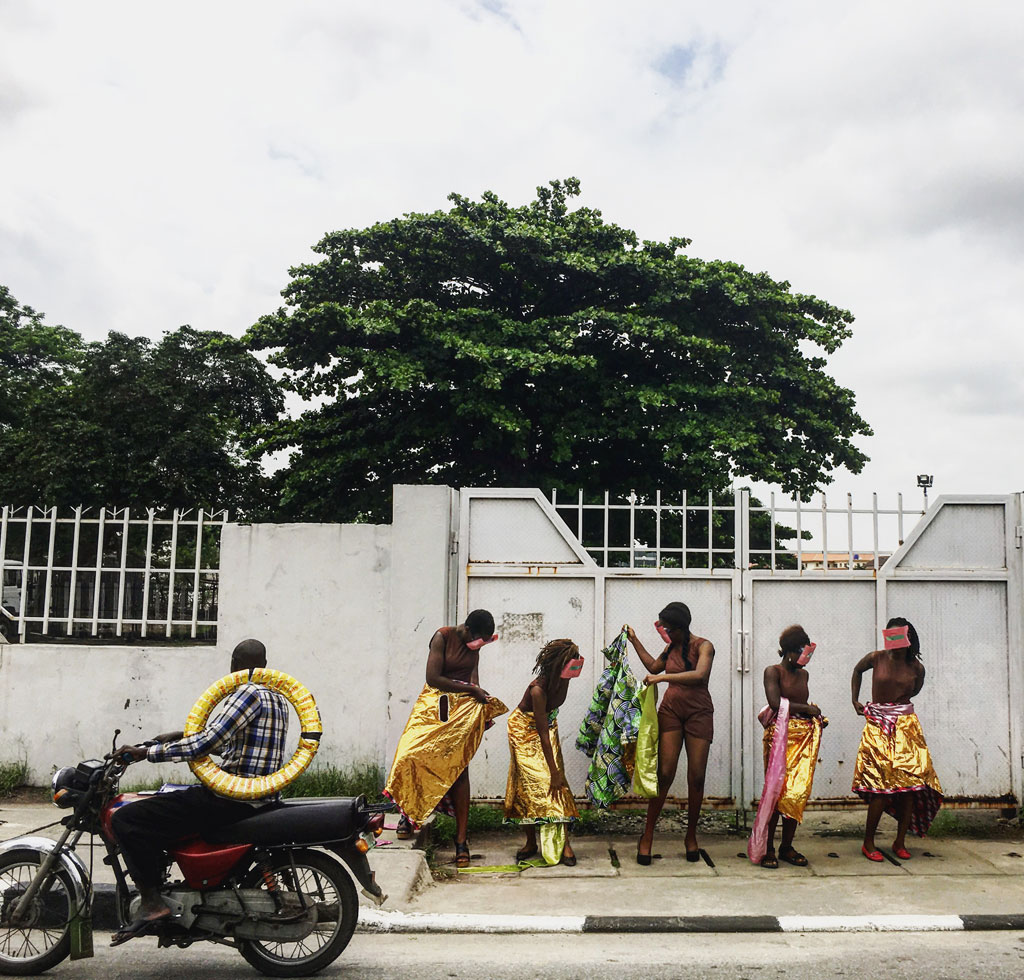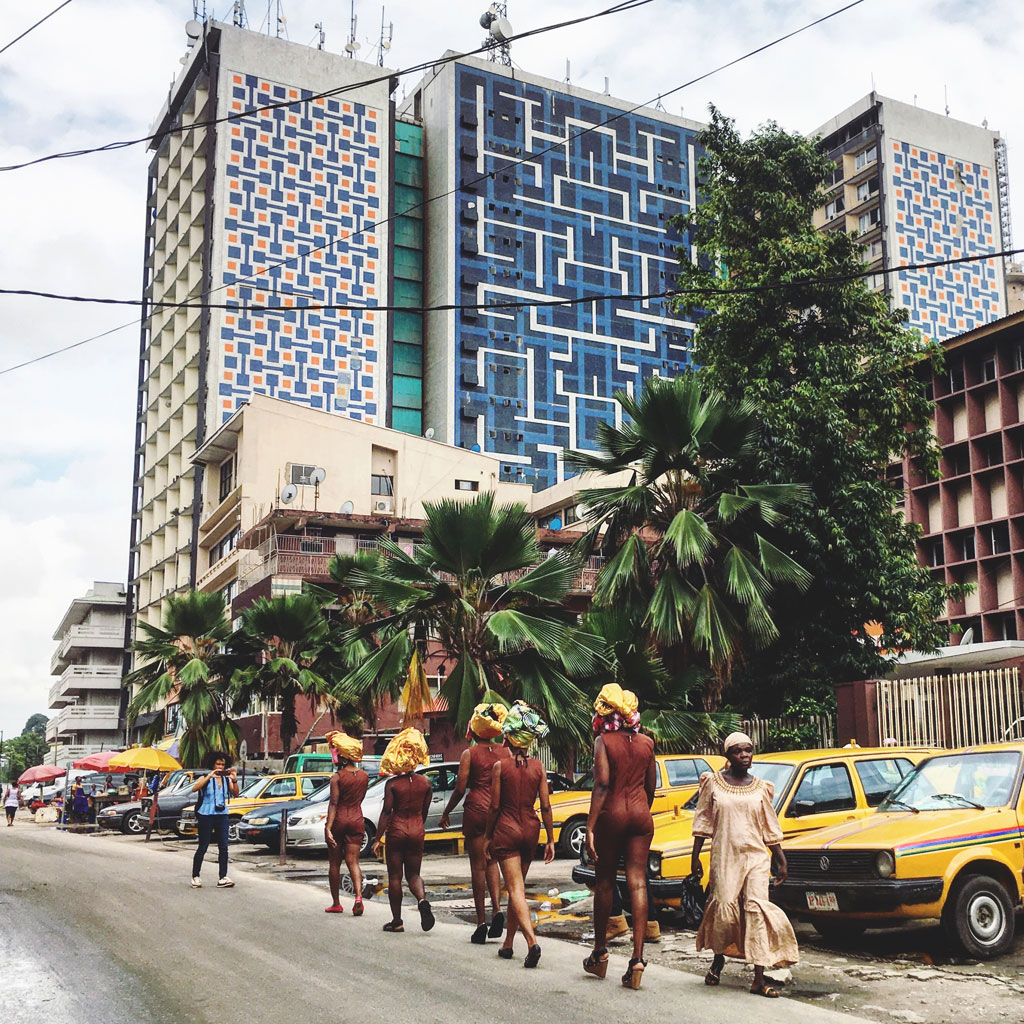Nigerian-American artist
Wura-Natasha Ogunji stops traffic with Strut - her latest street performance in Lagos
On the Badagry Expressway, the wide highway leading west from Lagos, bus stops are distant. With congestion added to geography, the in-between moments can stretch. As in most public space in this vast city, vague vacancy is capitalised upon. I have an 8-minute recording of a vendor who entered one danfo bus. He alternates accents; he flirts with the audience; there is a stand up routine. It’s a monologue, it’s theatre, he concocts a whole world and passengers are stuck to witness it because they are sitting in traffic and his presence echoes, filling every crevice of the metal belly of the van. Once the whole bus is engaged, he starts explaining the wonderful cure-all properties of the drug he is pushing. It heals everything from a cold to a parasite and only costs 50-naira.
On the street where I live, a rutted dirt road saturated with sanctuaries (two churches, a shrine and a mosque are all on the block), street-side preachers join the cacophony. They park and proclaim for hours through blaring loudspeakers: narrating, orating, vending hope and salvation. Meanwhile in the market, every so often, an imposing figure shrouded from head to toe in lush, layered fabric approaches pedestrians to pray and demand money. The Egungun masquerades represent ancestral spirits present in the space. During festivals they infiltrate the city, sending kids running to clear their paths.
I see performance everywhere in Lagos. It is part of tradition, part of religion, part of social interaction, part of commerce. Fashion plays its part too. It is the costume we wear in daily life to define ourselves, and the character we present in the public sphere. I am constantly arrested by Lagosians’ meticulous style. People don entirely different personas through clothing: for work, home, church, clubbing, weddings. The expression is both diverse and socially stratified. What one wears is indicative of class, taste, age and purpose. You can read Lagos on this surface, mesmerised by the kaleidoscope, or you can dig and find the layers, the structures, the meanings to everything. In a place pressed with so much humanity - by nature of its density if nothing else - that underlying complexity is both striking and disturbing.
In the midst of all this, Wura-Natasha Ogunji chose to drop her performance piece, Strut, last month. In doing so she spun a thread of impractical beauty in the tapestry of Lagos. “People here are always interested in whatever drama is happening,” Ogunji says. “I like this thing of causing people to be curious. There’s a lot of watching of tragic things in this place so it’s nice when people can watch things that are inventive and different and strange and maybe a little foreign but familiar. This pushes their own visual sensibility and experience and touches on tradition or history but also is something completely outside of what they’ve seen before.”
Five women dressed in brown body suits, reflective masks and golden headdresses that transmuted into a cape, took a brief, fast paced strut through Lagos Island. They paused at certain junctures to change clothes or just to vogue, their bright luminosity framed by the boxy, independence-era modernist architecture of the neighbourhood. Ogunji designed the costumes to be otherworldly and to have no practical use. The essential aim was beauty. “When I think about performance and especially this piece Strut, it’s really about that sense of free presence… there’s nothing I need to do to have value in the world, it’s just enough to be here,” she says.
But, like everything, the work is layered with meaning. It is ultimately about women and power, the body and liberty. Women strutting boldly, taking up space and attention and looking like mythical creatures is a reversal of their normal roles. “Through life I feel like I have been inundated with a lot of stuff: ‘be small, be quiet, stay dainty’ and now I’m pretty familiar that that’s just generally in the global lexicon of how women should behave,” says Tito Aderemi-Ibitola, one of the performers. Aderemi-Ibitola is also a Lagos-based artist, she works primarily with performance and video on the intersections of race, gender and ethnicity. Ogunji invited artists and women she knew to take part in Strut. It was the first time putting on a performance without participating herself.
In their iridescent masks, which loosely evoke traditional masquerade, the performers commanded reverence. “Here [masquerade is] not like a person with a mask on, no you are another thing,” Ogunji explains. The mask gave the performers the power to be something ethereal, or alien like. One bystander asked, “are you angels?”
Cars yielded to the women, a reversal of normal traffic rules where pedestrians scurry to avoid barreling buses and SUVs. “It’s an experience you don’t even know you are missing, because most likely you’ve never had it in your life, that you walk down the street and people move out of your way or are looking at you but they’re not consuming you,” Ogunji says. The mask works in both directions, its mysterious and regal aesthetic transmits authority outward; its shielding permits freedom. “The rush of being untouchable,” performer and artist Adeola Olagunju says, “I was present and absent at the same time.”
Ogunji has long engaged with masquerade, gender and public space through her performance, paper and video works. A Guggenheim fellow, she has shown at the Louisiana Museum in Copenhagen, The Edward Tyler Nahem Gallery in New York, Gordon Institute of Performing and Creative Arts in Cape Town and The Center for Contemporary Art in Lagos, among others. Her approach and her mood have evolved over time. For example, Will I Still Carry Water When I Am A Dead Woman? (2011) was an endurance task for which she and other performers dragged kegs of water through the streets of Lagos. It was an exhausting riff on the labour - usually, but not always, done by women - transporting water. The piece shed light on seemingly interminable and at times fruitless suffering. But by the time Ogunji re-performed it in Johannesburg, she had renamed it Can't I Just Decide To Fly? (2014) and had began to wonder, “Maybe this isn’t about the struggle, maybe the struggle doesn’t bring or teach or give anything significant, maybe we need to just be as free as we can be.”
Strut is a further response to this. It involves action, but it is not particularly taxing. It engages with gender in the public sphere, but this time instead of elevating women’s burden, it disrupts it. There is force in ritual action: it is one thing to imagine a different reality, but something completely different to perform feminine power in the world. “If I say I want women to have this feeling of freedom, the only way that can happen is through something creative, through the thirty minutes that they had on the street,” Ogunji says.
Strut will also travel, it is included in the upcoming Africa Forecast: Fashioning Contemporary Life exhibition at The Spelman College Museum of Fine Art in Atlanta this September. It will be re-performed in Lagos and perhaps also in Johannesburg and Luanda. In each place there will be local performers, local architecture, and perhaps local fabric, ways to adapt it to the context.
“It’s almost like a rip in the time-space continuum,” Aderemi-Ibitola says of the performance. For the women who took part, women who exist in the harsh, at times degrading complexity of Lagos, Strut was a half-hour apart, a time to just be magic.
Wura-Natasha Ogunji’s Strut was performed on 25 June 2016 by Adeola Olagunju, Aminat Lawal Agoro, Taiwo Aiyedogbon, Tito Aderemi-Ibitola and Yvonne Fly Onakeme Etaghene
Words and photography Allyn Gaestel
Visit Wura-Natasha Ogunji


